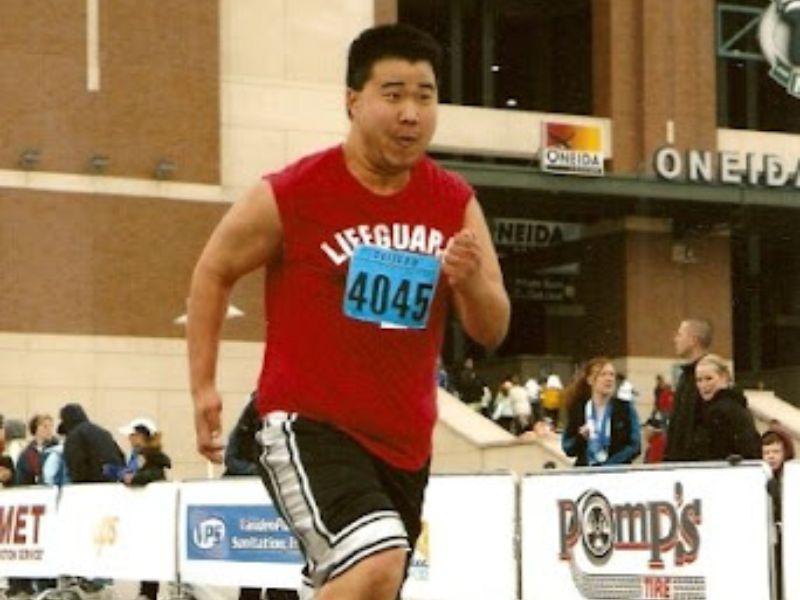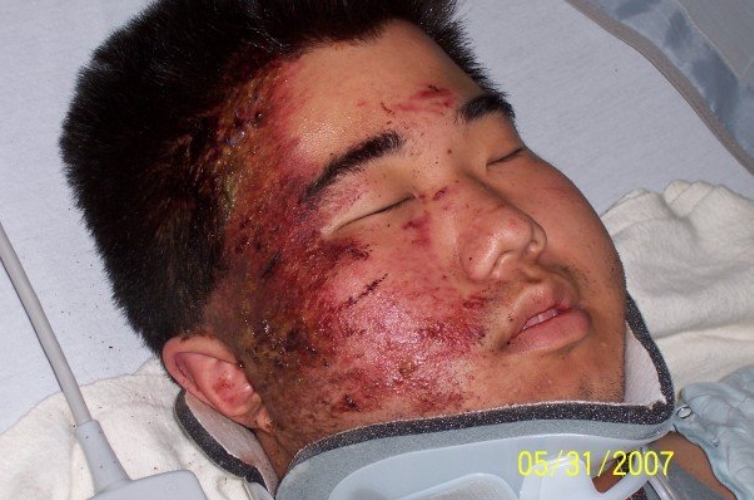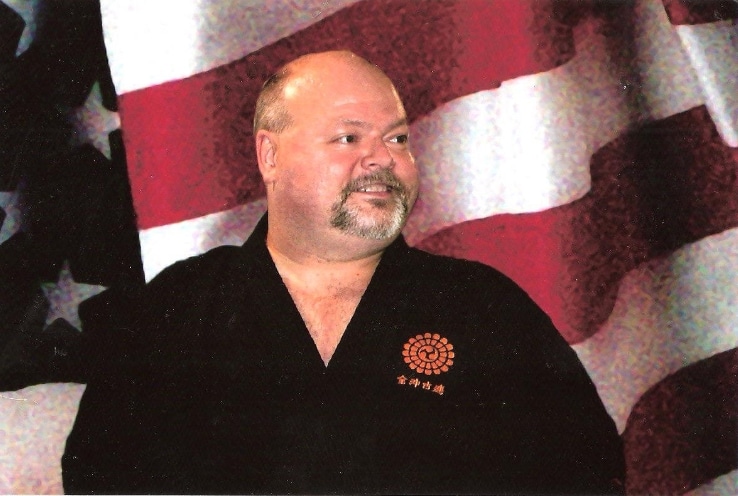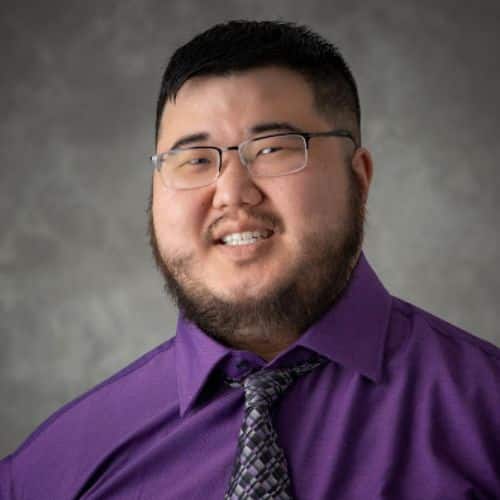Contents
Hello! Who are you?
Hello, my name is Andy Johnson and I was born in Seoul, South Korea, and adopted to two wonderful parents in northeast Wisconsin with a younger sister also adopted from South Korea. I moved around a lot in WI, but still call the area home as I currently live and work in the Green Bay, WI area.
I am employed as a mental health therapist owning my own business (private practice) and this would not have happened if my story did not unfold the way it did. So much of what I have learned through my pursuit of happiness and self-actualization came about because of my story.
I have been married for almost 9 years to my rock and cheerleader, Amanda. She has been with me through thick and thin and has helped me become the person I am today. We have been together for almost 9 years. While we do not have any children, we do have two dogs and two cats, our fur babies.
While I have been quite unhappy several years ago, I have grown quite fond of life and consider myself to be a happy and positive person most of the time.
I still have my struggles, but with a combination of medication and my own therapist, I believe I have found happiness and satisfaction in my life.
I still am in pursuit of knowledge that will help me and my clients succeed in life, while also balancing non-vocational happiness and developing myself outside of work.
💡 By the way: Do you find it hard to be happy and in control of your life? It may not be your fault. To help you feel better, we’ve condensed the information of 100’s of articles into a 10-step mental health cheat sheet to help you be more in control. 👇
What is your struggle and when did it start?
In May 2007, I felt I was on top of the world. I just decided in January that I was sick of living a sedentary lifestyle and wanted to train for a race. I had my dream set on a half-marathon and in May 2007, I successfully completed a local half-marathon in just over 2 hours, which was a fantastic start for me.

I set out to train for another race, a 10K race, just a few days after that. In the process of training for that, I would never have imagined at that time that the course of my life would forever be altered.
On May 31, 2007, I went on a routine training run of 5-6 miles when I was struck from behind by a speeding pickup truck. It hit me from behind and literally knocked me out of my shoes. I used to have flashbacks of someone screaming for help. It turns out this was the driver of the truck who thankfully had stopped and had to tackle me and hold me down to keep me from moving as I was in shock and started getting up trying to run away.
I skidded on my face and tore ligaments in my knee and shoulder. Other injuries include several broken bones in my pelvis and my skull had a fracture from my hairline to the top of my head. It took several stitches to close up a head wound. I sustained a contrecoup head injury.

I was in the hospital for several weeks with several months in a wheelchair and learning how to walk and perform simple concepts such as reading, writing, and math skills.
The contrecoup head injury came with several symptoms right away. The first that I noticed was depression. I wanted to die. I remember telling one of the nurses that I felt horribly sad and depressed. They talked with me and then with the team, but I was not prescribed any meds for depression or given any counseling. I felt numerous issues that I could not name but now some of the ones that stick out the most are:
- Impulsivity.
- Poor Judgement.
- Lapses and Gaps in Memory.
- Concentration Issues.
- Changes in Behavior and Personality.
- Problem-Solving Difficulties.
- Difficulty Differentiating Right From Left.
- Changes in Emotional Behavior/Regulation.
In addition, I also had severe headaches, photosensitivity, and amnesia, and was quite nauseous most of the time. These impacted me quite severely most of the time, especially in the 3-4 years following the traumatic brain injury (TBI). I also required multiple surgeries on my right knee to repair a ligament that kept tearing and one on my shoulder to anchor it in place.
How did this struggle make you feel at your worst moments?
I got the sense that other people knew I was struggling, but did not know how to interact with me due to my volatile mood and behavior. I could be totally fine one moment and then be a raging jerk the next. I lost many friends due to the aftermath of the TBI. In turn, the lack of social awareness, the impact of the TBI on my social life, and seeing myself hurting others while knowing this was not my normal personality hit me hard.
To others on the outside who did not know me well or were unfamiliar with neurobiology, I looked “fine” but was anything but fine. I would get comments from others such as, “You look fine. Grow up and act like an adult…” or “Stop crying like a baby and get over it.” As much as I tried to hide the facts, I was truly trapped as a prisoner in my own body.
I wanted to die and asked God several times to give me the courage to end myself. I was so unhappy and felt so unloved during this period of time it was hard to survive.
There were days it was difficult for me to get out of bed and go to class in college because I felt so depressed and worthless.
At one point, I got upset and made a comment to someone about how I just wanted the pain to end. This led to me being hospitalized in the ICU of a psych unit for a day. Thankfully, due to the love of my parents who came and spent the day with me, the doctor allowed me to leave into their care.
My Sensei/Karate Master noticed that I was suffering and helped me cope through the use of a Japanese healing art known as Reiki.
This healing provided some respite during my worst times and helped me begin the path to healing and recovery. My brief stay in a psych hospital also led to me being prescribed meds for depression and epilepsy, thus beginning my psychiatric care.

👉 Share your story: Help thousands of people around the world by sharing your own story. We would love to publish your interview and have a positive impact on the world together. Learn more here.
Was there a moment when you started to turn things around?
A truly pivotal moment came when my Introduction to Psychology professor came to me and asked me to take a course or two in the psychology discipline and see if the field was for me. I absolutely loved my Social Psychology course and felt like for the first time in a long time I belonged to something greater than myself.
I did not miss a semester of school after my accident and went on to get not just one, but two undergraduate degrees (Music – Saxophone and Applied Studies and Psychology) from the University of Wisconsin – Green Bay and a Master’s Degree in Rehabilitation Psychology from the University of Wisconsin – Madison.
I also came in contact with Dr. Steven Kaplan, a rehabilitation psychologist in the northeast WI area who helped me over 3 years recover from my accident emotionally and socially.
He helped me see that I indeed had worth and value and would not let me quit on myself. He was instrumental in my recovery and helped me learn how to forgive, not just myself for the things I had said and done to others, but also to be able to forgive the person who struck me.
Dr. Kaplan diagnosed me with Bipolar Disorder II based on the frequent ups and downs of my mood, but not in a normal fashion. My type of Bipolar Disorder was rapidly cyclical and I could experience highs and lows quickly vacillating over time rather than long spurts of the cycles. Knowing this opened my eyes and the eyes of future therapists and psychiatrists to how best to help me.
It took 3 years for me to be able to find some level of closure around the accident and this was 95% about the circumstances around me, mostly my faith which I had to wrestle with, and 5% of the actions I took. I am so thankful for my faith and the people God put in my life to help me through this event.
What steps did you take to overcome your struggle?
The first step I took in working through my mental illness was to forgive myself for what I had left undone and what I had done to others during my recovery that hurt them.
I also learned that forgiveness is not just for others, it is more for one’s own peace of mind and closure. I took the opportunity to meet with the person who hit me with their truck in the summer of 2010 right before I graduated and told them personally that I forgave them. It was an emotional experience for both of us.
Second, I had to realize that I needed to take my time healing both physically and mentally as I still have challenges that are subtle, but noticeable if one spends any length of time around me. I was used to going all out on exercise and martial arts when I had recently gotten approval from physical therapy to go back to normal routines or sooner if I felt the urge to do so, only to further cause injury.
I also later knew that I needed to recover emotionally and not overextend myself by either retreating too often or being in the presence of others too much to the point where I am too under or overstimulated.
I learned that by balancing my social interaction with others, I can still maintain healthy relationships, while not overexerting myself to the point where I become difficult to deal with due to emotional outbursts or hypervigilance/being on edge.
Another thing that really helped me cope is finding some sort of spiritual outlet for myself. I went through a period of time where I hated God and wanted nothing to do with my Christian faith or upbringing; however, my wife and her congregation helped me develop a faith life where I was able to start rebuilding a relationship with God. I now attend to both spiritual and mental perspectives of my health more than I have in the past.
I also learned that there is absolutely NO shame in talking to a therapist or taking medications. Therapists such as myself can help with navigating emotion regulation, building on mindfulness practices, or assisting in prompts for journaling difficult situations and emotions.
Personally, I used my therapist initially as a sounding board and then as a more goal-oriented source of support and guidance as situations came up. I now see using a therapist like brushing your teeth. It is good to get a good “mental cleaning” on a regular basis.
On that note, I also see no harm in being prescribed medications as needed by a doctor or nurse practitioner. It took several years and the right person to talk with to get a good rapport with the prescriber and also to figure out what the correct combination of meds for me would be. We have been successful after several other trials to come up with the right dosage and meds to be of optimal support to me.
Of course, I still need to do my part by eating right and getting a good night’s sleep, as well as working on recreational activities that take me out of work mode and allow me to fully enjoy my life.
Have you shared any of this with people around you in real life?
It took a while for me to feel comfortable sharing my story with others; however, I am now very comfortable sharing my struggle with others. I can now comfortably share with anyone interested in hearing a story of recovery and perseverance.
I have the most difficult time sharing my story with skeptics of mental health recovery or those who believe that once mentally ill, always mentally ill, but thankfully that stigma is starting to go away. It was difficult for me to share my struggles with my past job as I was in a high-level position that required finesse and a great deal of critical thinking and wit, things I struggle with.
I did leave that job and am now proudly in the operation of my own counseling practice. I took this leap of faith in order to follow my passion for helping others and using my lived experience to serve my community and others currently living with mental illness or mental health struggles.
I am proof that people with mental illness can contribute great things to society and I intend to keep following that passion for years to come.
If you could give a single piece of advice to someone else that struggles, what would that be?
Aside from the standard “You’re not alone” message, I want others to grasp their highest potential. We all have struggles in one form or another.
By negotiating with them, we can reach higher levels of self-actualization, thus becoming happier and more content with ourselves intrinsically rather than looking to others for our self-worth and value. Our pains and struggles in life lead us to develop what is called neuroplasticity, where the brain forms whole new neural pathways to help us improve our life situations and build positive coping skills that can last a lifetime.
For far too long, I looked to others for my personal and professional identity. Now, I realize that this must come from within.
I would also highly recommend engaging in fun activities. If you as a person going through mental health struggles finds it hard to do things that were once fun, acting the opposite of how you feel can be helpful to start to resume your normal activities with the zest for life you once had.
Journaling your feelings and what led you to different thoughts can also be helpful in sorting out the things going on in your head from a mental health perspective. As stated above, seeing a therapist can be great for working through this.
What have been the most influential books, podcasts, YouTube channels, or other resources for you?
- My Stroke of Insight by Jill Bolte Taylor taught me about living with a traumatic brain injury such as a stroke and how to rise above some of what others might call “deficits” and turn them into strengths.
- Brene Brown’s Ted Talk on The Power of Vulnerability taught me about the strengths of being vulnerable with yourself and sharing this with others. It also pertains well to being a strong and empathic leader.
- The 5 Reiki Principles have been a core to my beliefs about life and doing well for the world.
- Lastly, but definitely not by far the least is The Bible. This manuscript and the teachings of Christianity have been the cornerstone of who I am and what I aspire to live my life as.
- The Imposter Cure by Dr. Jessamy Hibberd helped give me the confidence I needed to believe in myself and be able to rise above my past state in life and believe that I too deserve happiness and enjoyment in life.
- The Subtle Art of Not Giving a F*ck by Mark Manson taught me that I only have so much time and energy to devote to things going on around me that I need to pick and choose what to care about the most.
Where can we go to learn more about you?
You can read more about me at:
- Facebook where I will post content about who I am and the interests that I follow.
- My professional therapist profile on Psychology Today, which is an introduction to clients who are interested in working with me as a mental health professional who chooses not to work with insurance for a number of reasons.
- My professional website, where anyone can go to search for general information about my private practice.
💡 By the way: If you want to start feeling better and more productive, I’ve condensed the information of 100’s of our articles into a 10-step mental health cheat sheet here. 👇
This Cheat Sheet Will Help You Be Happier and More Productive
Thrive under stress and crush your goals with these 10 unique tips for your mental health.
Want more interviews?
Continue reading our inspiring case studies and learn how to overcome mental health struggles in a positive way!
Want to help others with your story? We would love to publish your interview and have a positive impact on the world together. Learn more here.



